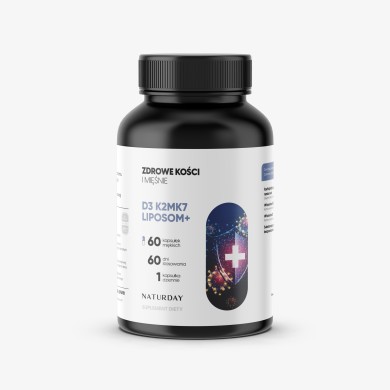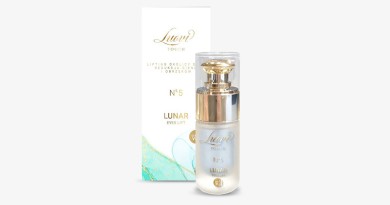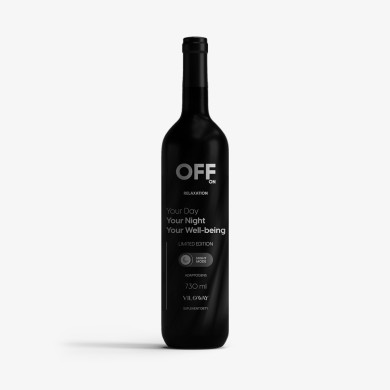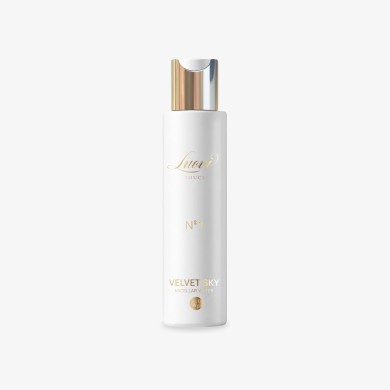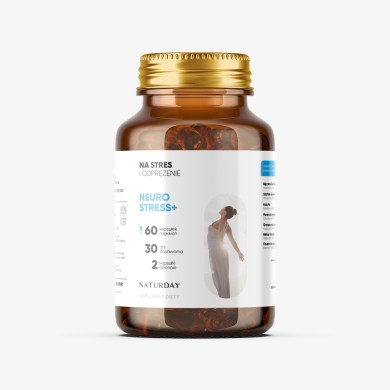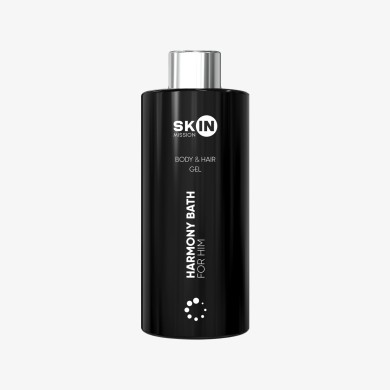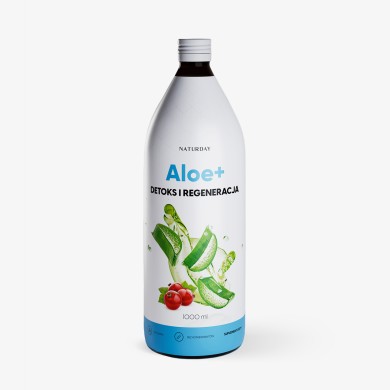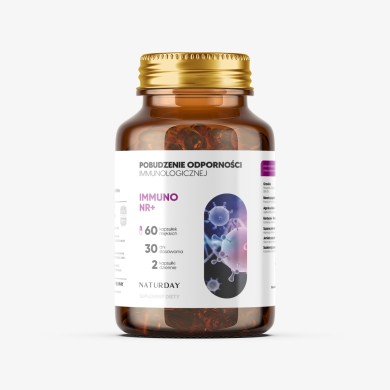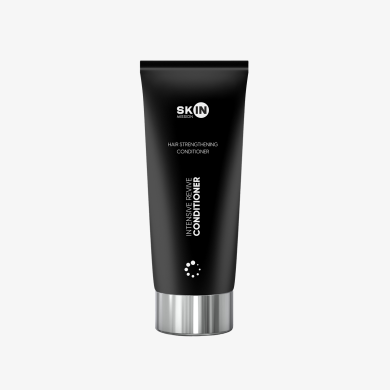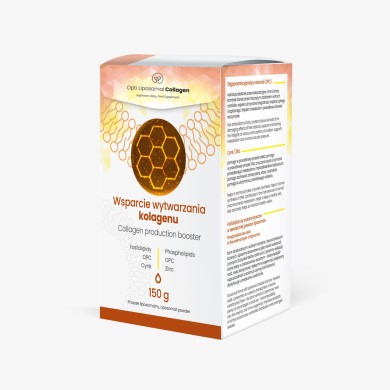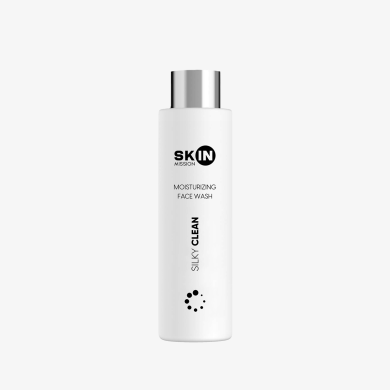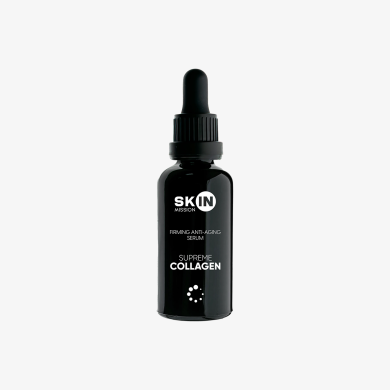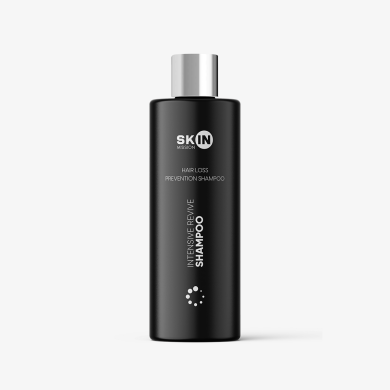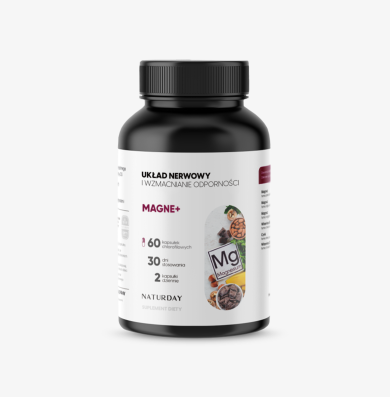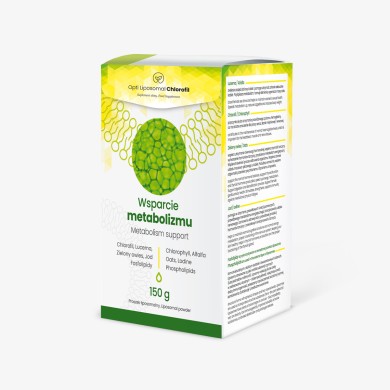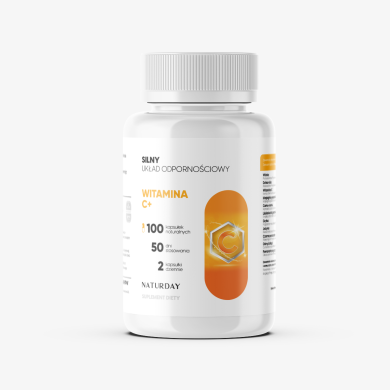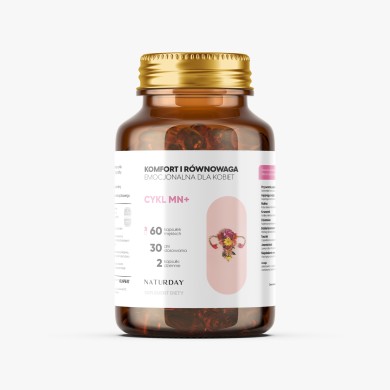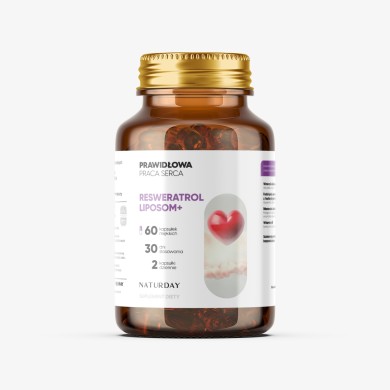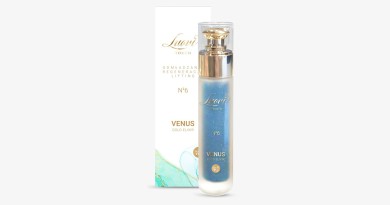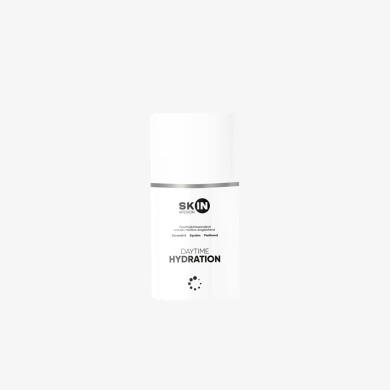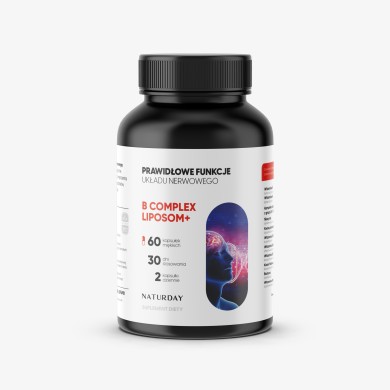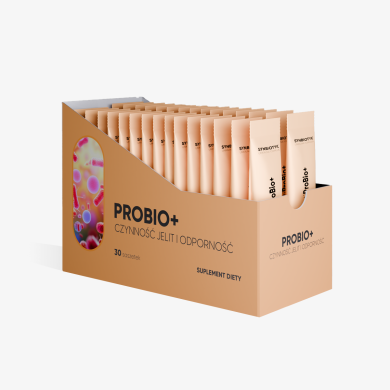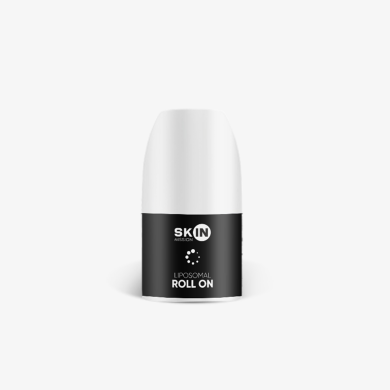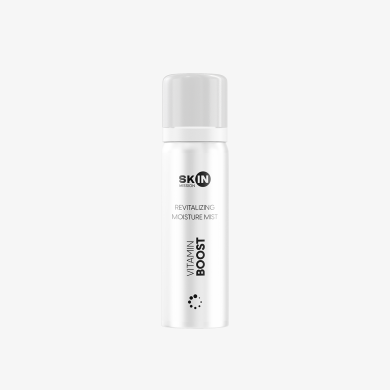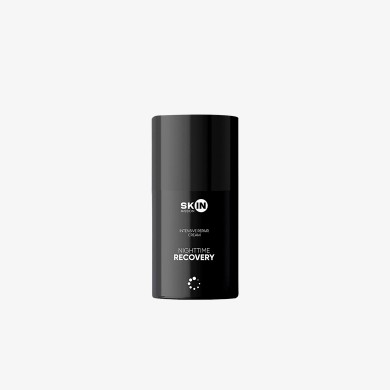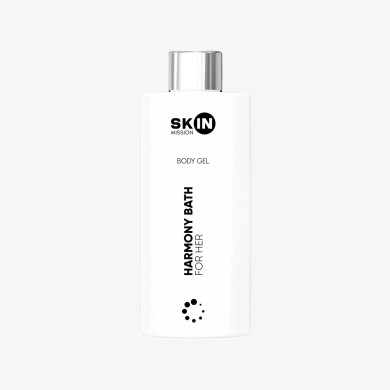- As many as 22 extracts with a powerful potential to support the entire body.
- All ingredients are preserved in their active form thanks to ultrasonic pasteurization.
- The synergy of the ingredients provides the power to restore balance, known as homeostasis.

Homeostasis is the key to happiness. It is the ability to maintain health despite unfavorable environmental conditions (e.g., toxins in the air, medications, processed food).
The Multi ON formula activates your life energy from the morning and keeps you in a state of mild stimulation throughout the day. It cares for your well-being during the day and has the ability to improve the efficiency of digestive processes. You will regain a sense of lightness in your stomach.
Recommended intake: 1 measuring cup of 25 ml once a day in the morning - Do not exceed the recommended daily dose.
The dietary supplement should not be used as a substitute for a varied diet and should not replace a healthy lifestyle.
The appearance of sediment is a natural occurrence due to the presence of natural ingredients.
Shake before use.
Content of ingredients in a daily portion of 25 ml:
Paprika fruit (Capsicum fruct.) juice - 12,5 g
Lemon fruit (Citrus limon fruct.) juice, DER 6:1 - 3,2 g
Alfalfa herb (Medicago sativa Herba) liquid extract, DER 1:14 - 390 mg
Assam tea leaf (Camellia assamica Folium) extract, DER 20:1 - 200 mg
Acai fruit juice concentrate (Euterpe oleracea Frucus) extract, DER 16:1 - 82 mg
Horsetail herb (Equisetum arvense Herba) extract, DER 1:620 - 35 mg
Red clover herb (Trifolium pratense Herba) extract, DER 1:775 - 28 mg
Ginseng root (Panax ginseng Radix) extract, DER 1:835 - 26 mg
Cinnamon bark (Cinnamomum Cortex) extract, DER 1:1033 - 21 mg
Irish moss (Chondrus crispus Thallus) extract, DER 1:1033 - 21 mg
Lavender flower (Lawendula angustifolia Flos) extract, DER 1:1033 - 21 mg
Chinese tea (Camellia sinensis) extract, DER 1:1033 - 21 mg
Marshmallow root (Althea officinalis Radix) extract, DER 1:1033 - 21 mg
Rosehip fruit (Rosa canina Fructus) extract, DER 1:1033 - 21 mg
Licorice root (Glycyrrhiza glabra Radix) extract, DER 1:1550 - 14 mg
Fennel fruit (Foeniculum vulgare Fructus) extract, DER 1:1550 - 14 mg
Elderberry (Sambucus nigra Flos) extract, DER 1:1550 - 14 mg
Guarana seed (Paulinia cupana Semen) extract, DER 1:1550 - 14 mg
Thyme herb (Thymus vulgaris Herba) extract, DER 1:1550 - 14 mg
Ashwagandha, Indian ginseng (Withania somnifera) extract, DER 1:3100 - 7 mg
Cardamom (Elettaria cardamomum) extract, DER 1:3100 - 7 mg
Turmeric (Curcuma longa) extract, DER 1:3100 - 7 mg
Ginger (Zingiber officinale Rosc.) extract, DER 1:7233 - 3 mg
Cayenne pepper fruit (Capsicum annuum), 98% piperine extract, DER 1:10850 - 2 mg
Storage: At room temperature, out of sunlight and out of reach of small children.
After opening the bottle, store in the refrigerator for no longer than 30 days.
Do not use the supplement in case of hypersensitivity to any of the ingredients.
Do not use in pregnant or breastfeeding women.
Multi ON
is for you if:
- you want to get maximum support using a minimum amount of supplements - Multi ON is 22 active ingredients.
- you are looking for a universal combination of ingredients to support body functions throughout the day.
- you want to be stimulated, without energy crashes and to maintain concentration while performing tasks.
- you are looking for extracts. EXTRACT has a much stronger effect than a regular herbal infusion. This translates into faster and better results.
- you want to support both the brain, heart, kidneys and digestive system.
Indications supported by Multi ON ingredients
Fatigue is a state of physical and/or mental exhaustion, characterized by weakness, lack of energy, difficulty concentrating and reduced physical performance.
Acne is a skin condition caused by inflammation of the sebaceous glands, leading to the formation of blackheads, pimples, cysts, and abscesses. It is most commonly seen during adolescence but can occur at any age.
Menopause is a natural stage in a woman's life marking the end of menstruation, typically occurring between the ages of 45 and 55. It is characterized by a decline in estrogen levels, leading to symptoms such as hot flashes, mood swings, insomnia and vaginal dryness.
Intestinal colic is a sudden, intense abdominal pain caused by intestinal cramps. It can result from bloating, constipation, infections or food intolerances. The pain typically comes in waves and is accompanied by a feeling of fullness.
Stomach and duodenal ulcers are sores on the mucous membrane of these organs, often caused by an infection with *Helicobacter pylori* bacteria or excessive use of pain medications. They are characterized by pain in the upper abdomen, heartburn, and nausea.
High cholesterol can lead to the formation of atherosclerotic plaques, increasing the risk of heart disease and stroke. The main causes include a diet high in saturated fats, lack of physical activity, smoking and genetic factors.
Diarrhea is a condition characterized by frequent, watery stools, usually associated with gastrointestinal problems. It can result from infections, food poisoning, stress or chronic diseases.
Gastroenteritis, also known as viral gastroenteritis, is an infection of the digestive tract caused by viruses.
Loss of appetite is a decrease or loss of the desire to eat, which can lead to malnutrition.
Constipation is the difficulty in passing stool at intervals greater than 3 days.
Convalescence is the period of recovery after an illness, surgery or injury. It involves the body's regeneration, the restoration of physical and mental strength and a gradual return to full functionality.
Cholecystitis is an inflammation of the gallbladder, most commonly caused by gallstones. It is characterized by pain in the upper right quadrant of the abdomen, fever, nausea and vomiting.
Tooth decay is a disease in which the enamel of the tooth undergoes demineralization, leading to its damage. It occurs as a result of acids produced by bacteria that break down sugars from food.
Cancer is the uncontrolled growth of cells in the body, leading to the formation of tumors. It can be benign (non-cancerous) or malignant. The latter, known as carcinoma, has the ability to spread to other parts of the body.
Bulimia is an eating disorder characterized by episodes of binge eating, followed by attempts to get rid of the food (e.g., vomiting, using laxatives) in order to prevent weight gain.
Anorexia is an eating disorder characterized by extreme restriction of food intake, a fear of gaining weight and a distorted body image.
Nausea is an unpleasant feeling of needing to vomit, often occurring as a symptom of various illnesses and conditions.
Redness of the eyes is a symptom in which the white part of the eye becomes red or pink. It can be caused by infections, allergies, fatigue or irritation.
Nervous exhaustion is a state of extreme mental and physical fatigue resulting from prolonged stress, excessive emotional or psychological strain. It manifests as decreased concentration, insomnia, irritability, anxiety and apathy. It can lead to burnout, depression or other health issues.
Reflux is a condition in which stomach contents flow back into the esophagus, causing heartburn, a burning sensation in the chest and sometimes pain. It can lead to damage to the esophageal lining and in the case of chronic reflux it can develop into gastroesophageal reflux disease (GERD).
Hypochlorhydria is a condition in which the secretion of hydrochloric acid in the stomach is too low. It can lead to digestive problems, bloating, a sense of fullness, and a weakened immune system.
Detox is the process of cleansing the body from toxins, harmful substances or excess substances that may negatively impact health.
Hashimoto's disease is an autoimmune thyroid disorder in which the immune system attacks the thyroid gland, leading to hypothyroidism. Symptoms include fatigue, weight gain, depression and sensitivity to cold.
Loss of appetite is a condition in which a person loses interest in eating, which can lead to a reduced desire for food. It can be caused by illnesses, stress, depression or other health disorders.
Magnesium deficiency is a condition where the magnesium level in the body is too low, which can lead to muscle cramps, weakness, fatigue, irregular heartbeat, and concentration problems.
Digestive problems are discomforts such as abdominal pain, bloating, heartburn, constipation, or diarrhea.
What do our recipients say about Multi ON?
Do you have Multi ON?
Describe your experience with the product, add a review and help others choose.
I've been using the Multi On herbal blend for some time now and I'm delighted! It's the perfect daily support - you can immediately feel that the ingredients are of high quality. The blend gives me energy, helps me concentrate and generally improves my mood. I love the delicate taste, which is great in the morning. I'm glad I came across a product that supports the body in such a comprehensive way. It will definitely stay with me for a long time - I highly recommend it!
I've been using the Multi On herbal blend for some time now and I'm delighted! It's the perfect daily support - you can immediately feel that the ingredients are of high quality. The blend gives me energy, helps me concentrate and generally improves my mood. I love the delicate taste, which is great in the morning. I'm glad I came across a product that supports the body in such a comprehensive way. It will definitely stay with me for a long time - I highly recommend it!

Delicious paprika flavor. I am already drinking the 2nd bottle and I feel much better during the day. I no longer have such energy slides during the day. I recommend it highly.
Delicious paprika flavor. I am already drinking the 2nd bottle and I feel much better during the day. I no longer have such energy slides during the day. I recommend it highly.

I'm already looking forward to when the package of Multi On comes to me. It has a wide-ranging effect due to the ingenious composition of herbs enclosed in a glass bottle,
I'm already looking forward to when the package of Multi On comes to me. It has a wide-ranging effect due to the ingenious composition of herbs enclosed in a glass bottle,

This Multi formula supports me throughout the day because of the ingredients in it, regulates stress levels and improves immunity, gives me energy
This Multi formula supports me throughout the day because of the ingredients in it, regulates stress levels and improves immunity, gives me energy

I recommend it wholeheartedly. Multi ON gives me energy for the whole day.
I recommend it wholeheartedly. Multi ON gives me energy for the whole day.

Thanks to Multi ON, I went through a cold much more smoothly, from which I recovered after 2 days. Previously, it took a minimum of a week to get over a cold and recover. I recommend it to those who don't want to waste time with colds.
Thanks to Multi ON, I went through a cold much more smoothly, from which I recovered after 2 days. Previously, it took a minimum of a week to get over a cold and recover. I recommend it to those who don't want to waste time with colds.

When I have little energy in the morning, Multi On gives me energy, and on top of that I feel that I take comprehensive care of my body, because it contains a lot of valuable ingredients - highly recommended!
When I have little energy in the morning, Multi On gives me energy, and on top of that I feel that I take comprehensive care of my body, because it contains a lot of valuable ingredients - highly recommended!

I swapped several other supplements for this one! Very high amount of active ingredients - for me convenience and economy. After a week of use a noticeable difference in the amount of energy and morning mood. Also stable energy during the day for which an extra plus.
I swapped several other supplements for this one! Very high amount of active ingredients - for me convenience and economy. After a week of use a noticeable difference in the amount of energy and morning mood. Also stable energy during the day for which an extra plus.

This is what your predecessors asked us about
Frequently Asked Questions
Multi ON contains ingredients that can help to fight fatigue thanks to the content of stimulants such as guarana and green tea. These natural ingredients can increase energy levels and improve concentration, making this product an excellent choice for everyone who is looking for natural energy support throughout the day.
Yes, Multi ON contains several stimulating ingredients, including guarana and green tea, which provide natural caffeine but do not cause energy crashes. This caffeine can increase alertness, improve concentration and provide an extra dose of energy, which is useful during long days of work or study.
Multi ON is specifically designed to support energy and vitality throughout the day, making it a great choice to start supplementing with. Its ingredients like guarana and green tea can provide immediate stimulation, while other ingredients like ashwagandha and ginseng support overall immunity and reduce stress.
Homeostasis is the process by which the body maintains stable internal conditions necessary for survival. It is the foundation of health and well-being, allowing all body systems to function optimally. Maintaining homeostasis is key to physiological balance and can be supported by an appropriate diet, lifestyle and supplementation offered by Multi ON.
Extracts are concentrated forms of herbs that contain higher concentrations of active ingredients than raw herbs. The extraction process allows you to separate these valuable substances from the rest of the plant, which facilitates their absorption by the body and may increase the effectiveness of a supplement such as Multi ON. Herbal extracts offer a more powerful and targeted effect than whole herbs.
Do you have any questions?
You are supported by our service office and experts.
From Monday to Friday 8:00 - 16:00.
